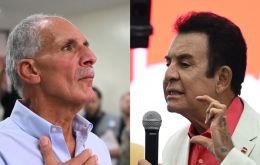MercoPress. South Atlantic News Agency
Latin America
-
Wednesday, December 10th 2025 - 22:59 UTC
Former Bolivian President Arce arrested in corruption probe

Former Bolivian President Luis Arce Catacora was arrested in La Paz on Wednesday afternoon in connection with a major corruption case involving the now-defunct Indigenous Peoples Development Fund (Fondioc).
-
Wednesday, December 10th 2025 - 10:23 UTC
Honduran crisis deepens as elections remain undecided

Honduran President Xiomara Castro has escalated the political crisis surrounding the undecided November 30 presidential election, condemning what she termed “interference” by US President Donald Trump and claiming an “electoral coup” was underway.
-
Tuesday, December 9th 2025 - 10:29 UTC
Ecuador: Former President Lenín Moreno to face trial for bribery

Former Ecuadorean President Lenín Moreno (2017-2021) has been ordered to stand trial on bribery charges in the high-profile Sinohydro Case regarding his alleged corruption deeds tied to the construction of the country's largest hydroelectric plant while Moreno served as Vice President under Rafael Correa (2007-2017).
-
Tuesday, December 9th 2025 - 10:27 UTC
Sweden closing Embassy in Bolivia

Swedish Ambassador to Bolivia Johanna Teague announced Monday that her country was downsizing its mission in Bolivia, leading to the closure of the diplomatic mission in La Paz by the end of 2026.
-
Tuesday, December 9th 2025 - 10:22 UTC
Fifth Kenyan Police group arrives in Haiti

A new contingent of 230 “highly specialized” Kenyan police officers landed at Toussaint Louverture International Airport on Monday, to reinforce the newly established Gang Suppression Force (GSF) in its fight against heavily armed groups.
-
Monday, December 8th 2025 - 10:49 UTC
Still no winner in Honduras after one week

No candidate has yet been named the winner of Honduras' presidential elections, one week after the polls, with vote counting halted several times due to glitches amid flipping leaders.
-
Monday, December 8th 2025 - 10:41 UTC
Motorbike bomb hits Colombian town of Balboa

A motorbike laden with explosives was detonated near the main park and police station in the municipality of Balboa on Saturday afternoon, December 6, causing widespread chaos and injuries in the Colombian province of Cauca.
-
Friday, December 5th 2025 - 10:52 UTC
US strike on alleged drug boat kills four in Pacific

The US Southern Command (Southcom) reported Thursday that four “narco-terrorists” were killed in the Eastern Pacific after a strike on a vessel allegedly linked to illicit narcotics trafficking. The incident comes amid growing domestic scrutiny over the legality and conduct of US military operations off Latin America's coast.
-
Friday, December 5th 2025 - 10:50 UTC
Honduras: Asfura back ahead amid deepening fraud allegations

Honduras' ruling party, as well as contender Salvador Nasralla, have denounced an ongoing “electoral coup” in Honduras involving vote manipulation and “brutal interference” from US President Donald Trump, as the National Party's Nasry Asfura -the candidate endorsed by Washington-surged back ahead on Thursday with 84.55% of votes tallied.
-
Friday, December 5th 2025 - 09:11 UTC
Flybondi eyes Paraguay flag carrier status

Argentine low-cost carrier Flybondi has announced an ambitious regional expansion plan involving a projected investment of US$1.7 billion and the establishment of a new operation under a Paraguayan flag.
